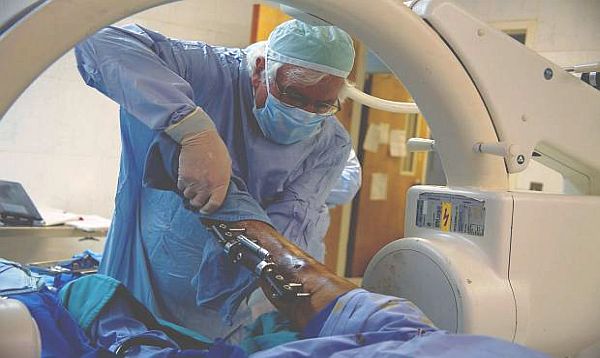Samachique, Chihuahua, Mexico - His life as a doctor has spanned the spectrum, from the opulence of Aspen to the poverty he found at the Sierra Madre of Mexico.
To Dr. Michael Berkley, operating on actor Jack Nicholson or a Tarahumara Indian, it's all the same after almost 30 years practicing as an orthopedic surgeon. When he lived Colorado, 15 years ago, Berkley used to operate on the richest of Aspen ó including Nicholson. These days he treats and operates on the poorest at the Mission Tarahumara Hospital in Samachique, Chihuahua, Mexico.
"One fights for providing the same kind of care to a Tarahumara as to a professional athlete in Aspen," says Berkley who 15 years ago, with his wife Maci, initiated Mexico Medical Missions, the nonprofit organization behind the hospital. "I have treated the richest and the poorest. The poorest donít complain so much".
Many lives and legs have been saved at the hospital, where four doctors see more than 10,000 people each year - most of them at no cost.Their budget today is $1 million. The hospital, which also provides jobs to dozens of Tarahumaras, is able to function thanks to the gifts from companies and individual donors.
"Women in labor are among those who benefit the most from the clinic," says Maci Berkley. "Many women could have died while giving birth, as they wonít come to the clinic unless they have complications - and most of them have complications caused by malnutrition and the fact that they are very young, teenagers."
"At least I think they donít believe we are there to eat their babies, like they used to think," Maci adds with a smile.
According to Berkley, many locals cannot believe that a group of Americans are there doing this work. But, little by little, the Tarahumaras are appreciating the work of the doctor and his team.
Years ago, Berkley saved the leg of a Tarahumara.
"He was a candidate for amputation, but after a year of surgeries and treatments we saved his leg," Berkley says. "He went home and a year after he returned and started jumping on his healed leg, said, Ďthank you,í and then he left and I never saw him again."
Berkleyís work has also been recognized through awards from various organizations. In November 2012, Berkley, 60, received a top award for his Altruist labor, by Dr. Simi, A.C.ís Foundation. In October he will receive another award for his social work from the Foundation Chihuahua Business Owners.
Even though philanthropic work is on the rise in Mexico, administrative issues persist, and money disappears sometimes, says Berkley. Most of the entities have administrative problems, such as the government of Mexico, and large portions of money donít reach their destination, he says. Nonetheless, the Mexican government now provides vaccinations for children, so at least thatís covered.
"We also have a good relationship with other specialists in the area, where we can refer certain patients whom we cannot treat," Berkley says.
Berkley does not get a salary for his work and only comes back to his house near Glenwood Springs, Colorado once every three months. "Faith in God is what helps people stay in places like the one where we are in Mexico; a place where there is nothing," says Berkley. "Itís hard, the hospital is isolated, but I really enjoy what I do."
Besides the isolation, the Berkleys face the uncertainty of living in the midst of narco routes and fights between the two drug cartels in Mexico, el Chapo GuzmŠn and the Chihuahua cartel.
"We are on the line," says Maci Berkley. "Sometimes they force the natives to grow marijuana and they have killed some of those who refused to. In our town there are about six residents who drive a truck and carry guns. They work for Chapo GuzmŠn."
During the 15 years he has been in Samachique, Berkley says he has seen some improvement, although very slow, in the lives of the locals. Mostly in education.
"Many finish high school now," he says. "Last year there were five graduates, most of which were Tarahumara and women. They also have 'some' access to scholarships to go to university."
Berkley says he doesnít think about retiring. "Fixing injured people is what I like to do the most," he says. "I will work until I can work no more."


